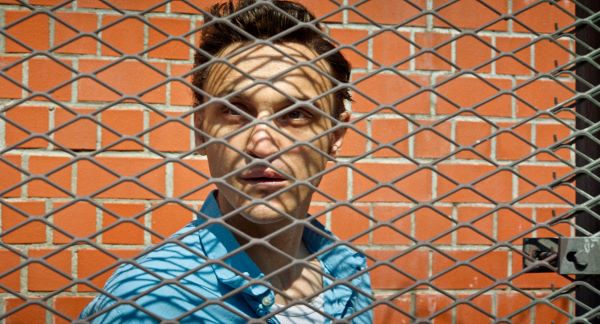![]() There is a lot of smoking in this movie. More specifically, there is much passing of cigarettes from one hand to another, perhaps easily, perhaps through a narrow slot into a dark cell. Matches are not always present, and cigarettes are not consistently available when prisoners need them. Nevertheless, they are sought after, exchanged, and smoked throughout this provocative film, so much that, by the end, the give and take of the sought-for item becomes one of many motifs that has attained fugue-like significance. The drama is set in a German prison at the end of World War II, then in 1957, then in 1968 (though not in that order), and cigarettes become something inmates covet as a routine or one of the few allowed expressions of independence.
There is a lot of smoking in this movie. More specifically, there is much passing of cigarettes from one hand to another, perhaps easily, perhaps through a narrow slot into a dark cell. Matches are not always present, and cigarettes are not consistently available when prisoners need them. Nevertheless, they are sought after, exchanged, and smoked throughout this provocative film, so much that, by the end, the give and take of the sought-for item becomes one of many motifs that has attained fugue-like significance. The drama is set in a German prison at the end of World War II, then in 1957, then in 1968 (though not in that order), and cigarettes become something inmates covet as a routine or one of the few allowed expressions of independence.
Imprisoned for “deviant sexual practices,” Hans Hoffman (Franz Rogowski), a gay man, is transferred to prison straight from a concentration camp at the end of World War II, a tattoo of his number fresh on his forearm. He returns to the same prison repeatedly over the course of several decades, sentenced under Paragraph 175, which outlawed sex between men and came into force in 1875. Viktor (Georg Friedrich), a straight man, incarcerated for a crime we do not immediately learn, remains there over the course of the same decades, present for Hans’s coming and going. Initially, they are cellmates, and Viktor, upon learning the nature of Hans’s crime, responds to him with fear and revulsion, until the discovery of the tattoo. After which, he offers to make a second tattoo over it. Hans accepts. The evolution of their complex relationship, along with their efforts to help one another survive, is one of the film’s central threads.
Great Freedom first begins in 1968 West Germany, then moves back to 1945, using Hans’s time in solitary confinement as a transition, then moves back and forth in time in a similar fashion throughout. As such, the film is as much about observing the contrast in similar circumstances over several decades. Though Viktor is far from a supporting player, the film really belongs to Hans. It is a grainy film recording his “crimes” in a men’s bathroom that we see first.
Watching the ways the prison-bound relationships vary in their complications, compromises, and resolutions is one of the more moving aspects of director Sebastian Meise’s film. Yet there are also, as noted before with the cigarettes, motifs which add to its emotional resonance: embraces, doorways opening in darkness, the peepholes through which one looks into a cell, the complete darkness of solitary confinement.
All of this is to say nothing of the acting. Rogowski, who has been used strikingly in recent films by Christian Petzold, is a beautiful combination of stoic and irrepressible. Even if he is dutifully sewing in the prison’s workshop, like the other inmates, we always see his burning need for connection and his willingness to break rules. Friedrich believably and fluidly plays Viktor’s contradictory set of emotions, the anger and the vulnerability, and scenes in which he truly loses control are incredibly powerful.
Though it reveals only slices of time over three decades, Great Freedom surpasses many recent films in thematic and emotional richness. It constitutes one of the more fulfilling cinematic experiences of the year thus far.

















Who else is here because Alexei Navalny seemed to be the person behind the steel-mesh fence.